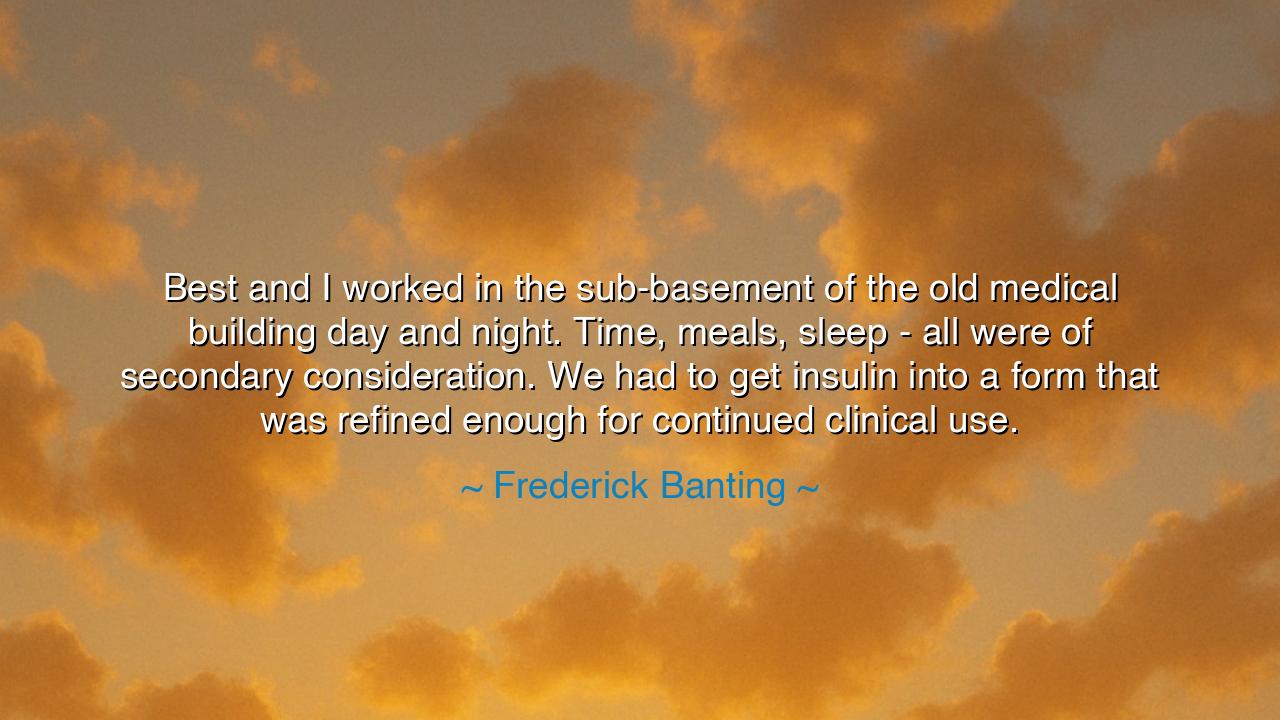
Best and I worked in the sub-basement of the old medical building
Best and I worked in the sub-basement of the old medical building day and night. Time, meals, sleep - all were of secondary consideration. We had to get insulin into a form that was refined enough for continued clinical use.






The words of Frederick Banting resound like a hymn to human perseverance: “Best and I worked in the sub-basement of the old medical building day and night. Time, meals, sleep—all were of secondary consideration. We had to get insulin into a form that was refined enough for continued clinical use.” In these humble yet thunderous words lies the spirit of discovery itself—the devotion that transcends comfort, the discipline that defies fatigue, and the sacred fire of purpose that burns in those who seek to heal humanity. Banting does not speak as a hero seeking glory, but as a servant of mankind, wholly consumed by his mission. His statement is both a record of struggle and a testament to the divine power of human will when guided by compassion.
In the early decades of the twentieth century, diabetes was a death sentence. Children and adults alike faded away, their bodies starved of vitality, their lives measured in months after diagnosis. No medicine, no hope, no reprieve—only the long descent into despair. It was in this time of darkness that Frederick Banting, a young Canadian surgeon, dared to challenge the impossible. Together with his assistant Charles Best, he descended—both literally and figuratively—into the depths of labor. The sub-basement of the medical building at the University of Toronto became their world: a chamber of trial, failure, and relentless experimentation. Surrounded by the stench of chemicals and the hum of primitive equipment, they pursued one goal—to isolate the mysterious substance in the pancreas that could control sugar in the blood.
His words speak of sacrifice—of the surrender of all earthly comforts to the call of discovery. “Time, meals, sleep—all were of secondary consideration.” These are not the exaggerations of ambition, but the simple truth of devotion. The greatest achievements in human history have always demanded such surrender. The builders of the pyramids, the navigators of uncharted seas, the scholars who bent their eyes over parchment by candlelight—all sacrificed comfort for purpose. Banting’s sleepless nights and empty meals were offerings on the altar of knowledge. He and Best became alchemists of life itself, refining raw discovery into a medicine that would save millions.
The day they succeeded was not marked by fanfare, but by quiet triumph. In 1921, when insulin was finally purified and injected into a dying boy named Leonard Thompson, the miracle unfolded: where death had lingered, life began to stir again. The boy revived. His hunger, his pain, his despair—lifted by a clear, shining liquid drawn from months of toil. That single moment transformed medicine forever. Banting’s quote, therefore, is not just the recollection of a scientist—it is the voice of a man who glimpsed the eternal through perseverance. He had wrestled with nature itself and brought back a fragment of salvation.
From the depths of that sub-basement, Banting and Best ascended into history. Their work became the cornerstone of modern endocrinology, saving untold lives and granting hope where none had existed. Yet the power of Banting’s words extends beyond science. It speaks to every soul that has faced exhaustion, failure, and doubt in the pursuit of something greater than themselves. It tells us that true creation is born not in comfort, but in struggle—that discovery blooms where dedication meets suffering. In that dark laboratory, surrounded by shadows and silence, two men carried the light of humanity forward.
There is an ancient echo to Banting’s spirit. Think of Prometheus, who stole fire from the gods to bring warmth to mankind. He too suffered for his gift, but his name endures as a symbol of sacrifice for the greater good. Banting was a modern Prometheus—his “fire” was insulin, his punishment the toll of sleepless nights and relentless labor. Yet unlike myth, his work brought not tragedy, but healing. Through his endurance, the flame of life was rekindled in millions who would have otherwise perished.
And so, my child of aspiration, take this teaching to heart: every true achievement demands the labor of the soul. Discipline, sacrifice, and faith in purpose are the architects of progress. When you tire, remember Banting in his sub-basement, working through hunger and night. When you doubt, remember the child whose life was saved by his hands. Greatness is not born of comfort—it is forged in the furnace of dedication.
For in the end, Frederick Banting’s words are not just a record of the birth of insulin—they are a call to courage. They remind us that the path of service to others often winds through darkness, but those who walk it bring forth light. Let us, too, labor for the good of others with the same unyielding heart, knowing that every act of perseverance carries within it the seed of transformation. For when we give all that we are for the sake of humanity, we too, like Banting and Best, become part of the eternal story of healing and hope.






AAdministratorAdministrator
Welcome, honored guests. Please leave a comment, we will respond soon